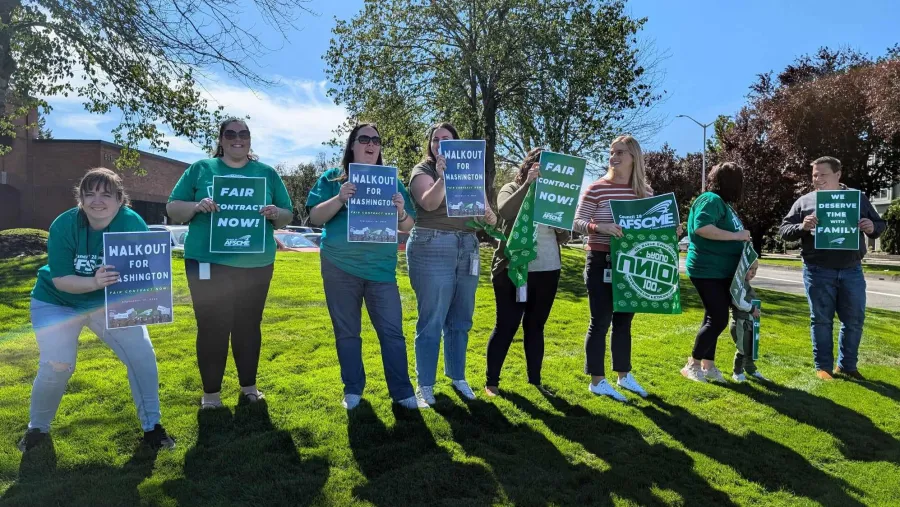Bargaining and the CBA

Collective bargaining is the process we use to negotiate, ratify, and fund our contract, or collective bargaining agreement (CBA). The CBA determines terms of employment such as pay, benefits, hours, leave, job health and safety policies, ways to balance work and family and more.
Every two years we have a new CBA - DCYF workers fall under the General Government CBA. As soon as the new CBA starts, we start working on the next one.
Learn more about the '25-'27 collective bargaining agreement here, or view the final agreement here. The '23-'25 contract is no longer active.
The bargaining cycle for the '27-'29 CBA has already begun. Learn about the timeline and steps involved. Have an idea for the next contract? Submit a proposal!
Bargaining Proposals and the Bargaining Team
In order to bargain a contract, our union needs two things (okay, yes, more than two things, but two really big ones): bargaining proposals and a bargaining team.
Bargaining proposals are the suggestions and asks from members for our contract. If you remember getting a lot of emails in 2023 asking for contract/bargaining proposals, that was this. Collecting these proposals lets the bargaining team know what is most needed, what members are looking for, and what to ask for in general. The DCYF Policy Committee also endorsed several proposals (see below) for our next contract.
The bargaining team is nominated and elected by members. You can view our bargaining team here. The team undergoes training to learn how to get the best outcome from negotiations. They go through our bargaining proposals and determine which ones are actionable in bargaining. Some proposals might need to be addressed legislatively (changing the law), instead of through a new contract. Some proposals might be for things that are already in the current contract, but that aren't being enforced. The bargaining team sends the proposals to the right place if they aren't directly used in bargaining.
After that, they start turning the individual proposals into an initial contract proposal to give to the state. If a proposal was for a pay raise for our clerical teams, they have to figure out what specific wording needs to be in the contract to make that happen. They also send out another survey to ask members to rank their priorities for bargaining.
Members choose the issues we fight for with each contract, we choose who does the fighting, and we choose how to prioritize each issue.
Contract Negotiations
Negotiations for the contract are conducted by elected members with assistance from WFSE staff. Our bargaining team develops the initial bargaining proposal to present to the employer, negotiates the details, and approves the final contract language. Once this is done, they make recommendations to members about whether we should approve or reject the proposed agreement. They have a great deal of independence, and can change their approach to specific issues in order to achieve the best possible contract overall. The negotiations are confidential by law, the bargaining team can only share a very limited amount of information about how they are progressing and what is being discussed.
The bargaining team and other parts of WFSE also organize campaigns and actions to gather attention around specific issues. The Support Staff Support Us All campaign was originally a petition started by the DCYF Policy Committee. It is now a statewide campaign meant to demand a raise for our support staff in the next contract.
Negotiations continue through multiple rounds with each side offering proposals and counter proposals until a tentative agreement is reached. Once a tentative agreement (TA) is reached, the ratification process begins. Members vote to accept or reject the tentative agreement offered by the bargaining team. Ratified agreements are then forwarded to the Office of Financial Management (OFM) for inclusion in the governor’s budget proposal to the Legislature.
Contract Funding
A critical next step is funding our ratified contracts. Our contract is introduced as a part of the governor’s budget proposal considered by the Senate and House where the budget is amended and debated until final passage. Member Lobby Days organize members and prepare them to engage their senators and representatives about funding the contracts. Member Lobby Days are scheduled throughout the legislative session.
Contract Enforcement
Shop stewards are the eyes and ears of a union. They make sure that the contract is enforced fairly. If there are problems, it is up to the shop steward to file a grievance or resolve the problems through other means. Learn more about stewards on our Get Involved! page.
Council representatives provide support to stewards when needed and take an active role when the issue cannot be resolved by the steward. This team approach provides a wide enforcement net for members.
Council 28 labor advocates provide enforcement through advanced grievance proceedings, arbitrations, negotiations and legal remedies as necessary.
*Adapted from the All About WFSE Member Orientation Guide
